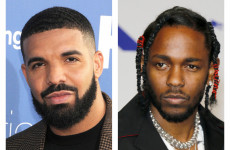Top Stories
Drake’s Defamation Lawsuit Against Universal Music Group Dismissed

A federal court has dismissed a defamation lawsuit filed by Canadian rapper Drake against Universal Music Group (UMG), ruling that the language in question constitutes opinion rather than fact. The decision, made by Judge Jeannette A Vargas, stemmed from a dispute linked to the ongoing rivalry between Drake and fellow rapper Kendrick Lamar, described by the judge as “perhaps the most infamous rap battle in the genre’s history.”
Drake initiated the lawsuit in January 2024, claiming that UMG published and promoted Lamar’s diss track, titled Not Like Us, which included allegations of paedophilia against him. Drake contended that the song suggested listeners should take matters into their own hands, leading to concerns over public perception and safety. Despite the serious nature of the accusations, Judge Vargas determined that a reasonable listener would not interpret the lyrics as conveying verifiable facts about Drake.
Context of the Case
The judge emphasized the context of a “heated rap battle” where incendiary language and offensive comments are commonplace. She articulated that while the accusation made in the song is severe, the overall environment of the competition between the two artists would lead listeners to understand that the statements were not intended to be taken literally.
“Although the accusation that the plaintiff is a paedophile is certainly a serious one, the broader context… would not incline the reasonable listener to believe that Not Like Us imparts verifiable facts about plaintiff,” Vargas stated in her ruling.
UMG’s Response
UMG, the parent company for both artists, denied any wrongdoing. In a statement following the ruling, the company expressed relief at the court’s decision, asserting that the lawsuit posed a threat to artistic freedom. “From the outset, this suit was an affront to all artists and their creative expression and never should have seen the light of day,” the statement read. “We’re pleased with the court’s dismissal and look forward to continuing our work successfully promoting Drake’s music and investing in his career.”
Drake’s lawsuit claimed that the track not only harmed his reputation but also led to incidents of violence at his home in Toronto and diminished the value of his brand. The outcome highlights the complex interplay between artistic expression and legal accountability within the music industry, particularly in the context of rap battles that often employ hyperbolic and confrontational language.
The dismissal of this case may set a precedent regarding future disputes over artistic expression and defamation in the music industry, particularly in cases involving lyrical content that could be interpreted in various ways.
-

 Top Stories4 weeks ago
Top Stories4 weeks agoTributes Surge for 9-Year-Old Leon Briody After Cancer Battle
-

 Entertainment2 months ago
Entertainment2 months agoAimee Osbourne Joins Family for Emotional Tribute to Ozzy
-

 Politics3 months ago
Politics3 months agoDanny Healy-Rae Considers Complaint After Altercation with Garda
-

 Top Stories2 months ago
Top Stories2 months agoIreland Enjoys Summer Heat as Hurricane Erin Approaches Atlantic
-

 World3 months ago
World3 months agoHawaii Commemorates 80 Years Since Hiroshima Bombing with Ceremony
-

 Top Stories3 months ago
Top Stories3 months agoFianna Fáil TDs Urgently Consider Maire Geoghegan-Quinn for Presidency
-

 World3 months ago
World3 months agoGaza Aid Distribution Tragedy: 20 Killed Amid Ongoing Violence
-

 World3 months ago
World3 months agoCouple Convicted of Murdering Two-Year-Old Grandson in Wales
-

 Top Stories4 weeks ago
Top Stories4 weeks agoNewcastle West Woman Patricia Foley Found Safe After Urgent Search
-

 Top Stories2 months ago
Top Stories2 months agoClimbing Errigal: A Must-Do Summer Adventure in Donegal
-

 Top Stories2 months ago
Top Stories2 months agoHike Donegal’s Errigal Mountain NOW for Unforgettable Summer Views
-

 World3 months ago
World3 months agoAristocrat Constance Marten and Partner Convicted of Infant Murder








